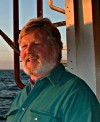
Nianhong Chen, Ph.D.
Assistant Professor, Department of Natural Sciences
Bio: Dr. Chen is interested in the application of biomarker techniques in coastal/marine biogeochemical cycle of organic matter derived from both terrestrial and aquatic origins. The goals of these studies are to understand source, fate and transport of organic matter derived from terrestrial and coastal marine origins.
Curriculum vitae

Paulinus Chigbu, Ph.D.
Professor of Fisheries Science and LMRCSC Director
Bio: Dr. Chigbu has been Director of the LMRCSC since 2006. He received his B.S. (Honors) and M.S. degrees in Zoology (concentration in Hydrobiology) from the University of Benin, Nigeria and his Ph.D from the University of Washington School of Fisheries. Since coming to UMES, he has established numerous programs for research and education in the marine sciences which he also directs, including the NSF CREST Center for the Integrated Study of Coastal Ecosystem Processes and Dynamics in the Mid-Atlantic Region (CREST-CISCEP) and a NSF Research Experiences for Undergraduates site in Marine and Estuarine Science. He is also Director of the NSF-funded Professional Science Masters program in Quantitative Fisheries and Resource Economics at UMES. Dr. Chigbu’s primary research interests are: fisheries and zooplankton ecology, particularly the influence of variations in climatic factors on water quality and biota, and trophic dynamics in marine and freshwater environments.
Curriculum Vitae

Ali Ishaque, Ph.D
Professor, Environmental Toxicology
Bio: Dr. Ishaque’s research interests are: identifying molecular biomarkers for contaminant exposure and the effects of mixtures of chemical stressors (non-essential metals and stable xenobiotics) on ecosystems. He holds a Ph.D in Ecotoxicology and a M.S. degree in Marine Ecology from the Free University of Brussels, Belgium and a B.S. in Chemistry from the University of Science and Technology, Ghana.
Curriculum Vitae

Eric May, Ph.D
Professor, Fish Biology and Pathology
Bio: Dr. May’s research interests are the use of biochemical and metabolic indicators to determine the response of fish to injurious agents or conditions, establishment of clinical methods as a means of non-lethal testing of wild and cultured stocks, the effects of environmental damage on resident aquatic organisms and application of fish health management approaches for use in aquaculture and wild stocks. Dr. May received his Ph.D from Oregon State University in Biochemistry, Pathology and Microbiology. He also completed his B.S. in Zoology at OSU, with a minor in fisheries. His M.S. from Northern Arizona University was in Cell Biology and Parasitology.
Website

Margaret Sexton, Ph.D
Research Assistant Professor of Marine Biology
Bio: Dr. Maggie Sexton received a B.S. degree in Marine Science and Biology from Coastal Carolina University in 2003 and a Ph.D. in Marine, Estuarine, and Environmental Science from the University of Maryland in 2012. Her dissertation research, conducted at the Horn Point Laboratory, sought to characterize inter-annual and intra-annual variability in the abundance of the sea nettle Chrysaora quinquecirrha in Chesapeake Bay and the environmental conditions that cause this variability. She joined the LMRCSC in 2013. Her current research interests include the biology and ecology of gelatinous zooplankton in the Chesapeake Bay and Maryland Coastal Bays, particularly the early life stages of C. quinquecirrha.
Curriculum Vitae


